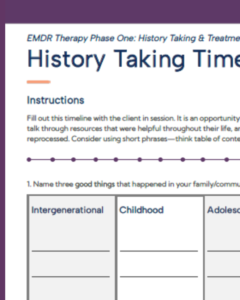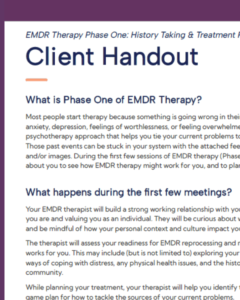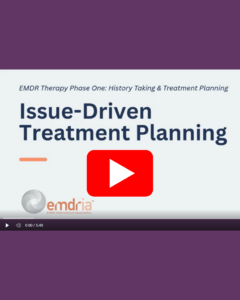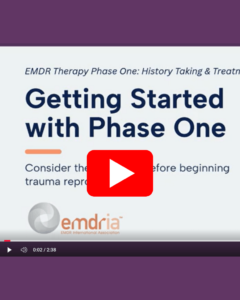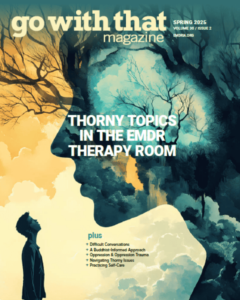International Trauma Questionnaire (ITQ) (International Trauma Consortium)
A self-report tool for assessing ICD-11 PTSD and Complex PTSD, along with translations and scoring guidelines.
Read MoreMultidimensional Inventory of Dissociation – 60-item version (MID-60) (NovoPsych)
Clinically supported, 60-item version of the Multidimensional Inventory of Dissociation for use in assessing dissociative symptoms in adults.
Read MoreHistory Taking Timeline (Phase 1 Toolkit)
A visual timeline for organizing client history.
Read MoreClient Handout (Phase 1 Toolkit)
An introductory handout on Phase One of EMDR therapy to share with your clients.
Read MoreIssue-Driven Treatment Planning Video (Phase 1 Toolkit)
This video offers guidance and an example of issue-driven treatment planning during Phase One of EMDR therapy.
Read MoreGetting Started with Phase One Video (Phase 1 Toolkit)
This quick video introduction offers guidance for orienting yourself to Phase One of EMDR therapy and structuring early client sessions.
Read MorePatient Health Questionnaire (PHQ) Screeners (Pfizer)
This website provides the GAD-7 and many versions of the PHQ screening tools.
Read MoreEMDR and the power, threat, meaning framework (EMDR Therapy Quarterly, 2025)
This article explores the Adaptive Information Processing (AIP) model of EMDR and the Power, Threat, Meaning Framework (PTMF).
Read MoreCounselor’s Corner: Clients with Aphantasia
EMDR therapists respond to the question, “Who has experience treating trauma with EMDR for clients with aphantasia?
Read MoreAuthentic Clinical and Theoretical Decision Making in EMDR Therapy Across the Life Span
Explore how theory, attunement, and embodiment guide adaptive EMDR practice beyond protocolized approaches for deeper client healing.
Read MoreInstruments: Benevolent Childhood Experiences (BCEs) scale (University of Denver)
There are three versions of the BCEs scale (the BCEs-Original scale, the BCEs-20 scale, the BCEs-Revised scale), all have unique advantages.
Read MoreFree Videos of EMDR Sessions (Philip Manfield, Phd)
Free video examples of EMDR sessions by Philip Manfield of trauma processing including dyadic resourcing sessions and the flash technique.
Read More

